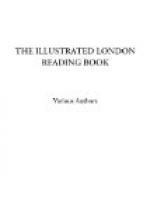CAMPBELL.
* * * * *
HAGAR AND ISHMAEL.
[Illustration: Letter H.]
Hagar and Ishmael departed early on the day fixed for their removal, Abraham furnishing them with the necessary supply of travelling provisions. “And Abraham arose up early in the morning, and took bread and a bottle of water, and gave it unto Hagar, putting it on her shoulder, and she went away.” The bottle here mentioned was probably made of the skin of a goat, sewn up, leaving an opening in one of the legs to serve as a mouth. Such skin bottles are still commonly used in Western Asia for water, and are borne slung across the shoulders, just as that of Hagar was placed.
It seems to have been the intention of Hagar to return to her native country, Egypt; but, in spite of the directions she received, the two travellers lost their way in the southern wilderness, and wandered to and fro till the water, which was to have served them on the road, was altogether spent. The lad, unused to hardship, was soon worn out. Overcome by heat and thirst, he seemed at the point of death, when the afflicted mother laid him down under one of the stunted shrubs of this dry and desert region, in the hope of his getting some relief from the slight damp which the shade afforded. The burning fever, however, continued unabated; and the poor mother, forgetting her own sorrow, destitute and alone in the midst of a wilderness, went to a little distance, unable to witness his lingering sufferings, and then “she lifted up her voice and wept.” But God had not forgotten her: a voice was heard in the solitude, and an Angel of the Lord appeared, uttering words of comfort and promises of peace. He directed her to a well of water, which, concealed by the brushwood, had not been seen by her. Thus encouraged, Hagar drew a refreshing draught, and hastening to her son, “raised him by the hand,” and gave him the welcome drink, which soon restored him. This well, according to the tradition of the Arabs, who pay great honour to the memory of Hagar, is Zemzem, near Mecca.




